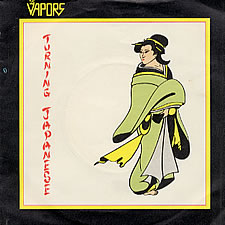Composition and recording
The songwriter, David Fenton, intended the song to be a love song, with the character of the song "pining over a photograph of his ex-girlfriend" in his bedroom, drawing from Fenton's own experience of being rejected. Fenton wrote the song in his flat, but had problems writing the chorus. He said that the chorus then came to him suddenly when he woke up at 4 a.m. with the lyric "Turning Japanese, I think I'm turning Japanese" in his head, and he used it due to the fact that it described changes he was undergoing at the time. [3]
The song was produced by Vic Coppersmith-Heaven, who had previously rejected a request to produce for the band after listening to demos sent to him by the band's managers, John Weller (father of Paul Weller) and Bruce Foxton. The band's unsuccessful first single, "Prisoners", was therefore produced by someone else. Coppersmith-Heaven later had another listen to the demos and agreed to produce "Turning Japanese" for them. He proposed several changes to the arrangement of the song, which were made. He recorded the Vapors live to capture the energy of the band, before stripping it down to just the drums, and then overdubbed the song. According to Fenton, the drummer did not like the song and "just went 'Boom! Splat!'" in the recording, but the band thought it sounded good and kept it. [3]
The band suspected they would score a hit with "Turning Japanese", even delaying its release to make it their second single, hoping to avoid becoming "one-hit wonders". Nonetheless, they never matched the singles' success. [4] In Australia, it spent two weeks at No. 1 during June 1980. [5] The music video was directed by Russell Mulcahy. [6]
This page is based on this
Wikipedia article Text is available under the
CC BY-SA 4.0 license; additional terms may apply.
Images, videos and audio are available under their respective licenses.
